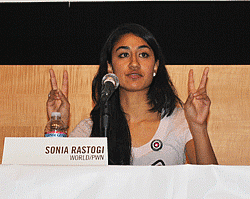HIV/AIDS Shows Alarming Rise Among Asian American Women
The increase in HIV infections has risen alarmingly among Asian American women, and will soon surpass the rate of infections in high-risk populations unless intervening measures are taken, noted a panel of experts in San Francisco on May 17.

By Sunita Sohrabji
SAN FRANCISCO, Calif. – The increase in HIV infections has risen alarmingly among Asian American women, and will soon surpass the rate of infections in high-risk populations unless intervening measures are taken, noted a panel of experts here May 17.
The panel discussion was held at the San Francisco Public Library and organized by the Asian and Pacific Islander Wellness Center to commemorate the seventh annual National API HIV/AIDS Awareness Day.
HIV/AIDS infections amongst Asian American women have risen by 14 percent since 2006, Stephanie Goss, a spokeswoman for the API Wellness Center, told India-West.
"Data from the Centers for Disease Control and Prevention indicate that the HIV infection rate in A&PI communities will surpass that of Latinos by 2015 and of African Americans by 2020 if left unchecked," said Tri Do, an
assistant adjunct professor of medicine at the University of California, San Francisco.
Three thousand Asian American women currently live with HIV/AIDS infections, said Boston University researcher Hyeouk Chris Hahm, after presenting her findings on API women's risky sexual behavior and the low rates of HIV testing in the community.
These rates currently represent only one percent of all U.S. women infected with HIV/AIDS, she said, noting, however, that while new infections are decreasing in the overall population, they are increasing among Asian American women, whose rate of infection is currently higher than that of Asian American men.
The number of Indian American women infected with HIV/AIDS is unknown, since health data is not disaggregated amongst the various Asian American sub-ethnicities.
"The stigma of being HIV-positive is huge in the South Asian community here," Bhupendra Sheoran, former associate director of Community Development at the Asian and Pacific Islander Wellness Center, told India-West in an earlier story.
"There are not only repercussions for the local family but also for the larger family back home," said Sheoran, who spent several years working with HIV/AIDS patients in India.
Asian American women are very unlikely to ask their partners or spouses to use a condom, one of the easiest ways to prevent infection, said Hahm, noting that API women tend to believe they are somehow immune from the disease.
There is also a strong need to project innocence and virginity to prospective partners, and to choose partners who are similarly "clean," asserted Hahm, adding that a woman's degree of malleability within a relationship was an important factor for Asian American men.
Sonia Rastogi, a spokeswoman for the Positive Women's Network based in Oakland, Calif., said Asian American women rarely have the ability to negotiate for condom usage by their partners or spouses, especially in traditional marriages where the female partner is expected to be a virgin.
Coercion and power dynamics play a big role in condom negotiation, particularly in relationships where the women is experiencing physical or verbal abuse, said Rastogi.
"Low self-esteem and depression plays a huge role in whether a woman will ask her partner to use a condom," she said.
Asian American women also face a number of barriers towards getting tested, said Rastogi, noting that health care providers believe the community to be at low-risk for HIV/AIDS infections. "Providers turn them away from getting tested if they're in monogamous relationships or married," she said.
Jaimie Kahale-Callahan, a single mother of two who got infected by her former husband, said she was dropped by her primary care provider after disclosing her HIV-positive status. Callahan then found a new doctor and has been living with HIV for more than 20 years.
The panelists all agreed that more resources need to be directed towards the Asian American population for research and education and that the stigma of getting tested and being HIV-positive must also be addressed.
Miss India USA 2009/2010 Priyanka Singha moderated the panel discussion.
This year marks the 30th anniversary of the first diagnosed case of AIDS.

